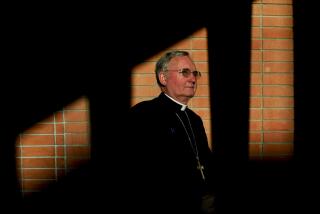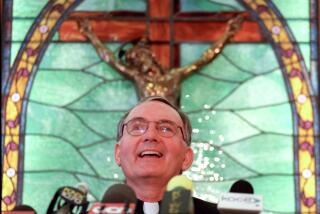O.C. Catholic Bishop to Lead Church’s U.S. Interfaith Effort
- Share via
Orange County’s Roman Catholic Bishop Tod Brown on Monday will become the church’s national leader of interfaith affairs, a day after a pact is to be signed mending a centuries-old rift with the Lutheran Church.
The appointment, announced Wednesday, places Brown at the crux of a historic shift in relations between Catholics and other Christian denominations.
The Lutheran agreement to be signed in Germany on Sunday settles a theological disagreement dating back to the 16th century split between Catholics and Protestants. But leaders of both churches say it will bring practical benefits to 60 million Catholic parishioners in America and millions more who belong to denominations of the World Lutheran Federation.
Brown, elected by fellow American bishops to become chairman of the National Conference of Catholic Bishops’ Ecumenical and Interreligious Affairs Committee, will mark the pact with an unusual joint service Sunday night with Murray Finck, bishop of the Pacifica Synod of the Evangelical Lutheran Church in America, the nation’s largest Lutheran denomination.
“My priority here is to be the best shepherd of our church community that I can be,” said Brown. “It’s an exciting time to be in the area of ecumenism.”
Though progress is slow, the promise of closer relations with other Christian denominations raises the real possibility of an eventual unification in the third millennium, Brown said.
“I would hope that the distant goal of dialogue between our church and the Lutherans would be some kind of organic union at the end of the trail,” said Brown. “We both understand that it’s the will of Jesus that all his disciples become one.”
Finck was more cautious.
“I feel very positive and delighted that we’ve begun to take these very positive steps,” he said. “In time, it would be wonderful to have us all united, but realistically I don’t believe that’s in the near future. . . . We’re just at the threshold of something new. The timing is perfect as we move into a new millennium.”
Replacing Bishop Alexander J. Brunett of Seattle, Brown will serve a three-year term as chairman of the interfaith board. He plans to travel and meet with religious leaders on the international level and perhaps help draft future pacts with other faiths.
Brown also plans to make ecumenical progress in Orange County. He has already invited a regional dialogue between Muslims and Catholics that will begin locally in February.
But Brown, who came to the Diocese of Orange from Idaho just over a year ago, acknowledged that his new national role will cut into the time he has available here.
Brown’s position with the Ecumenical and Interreligious Affairs Committee is in tandem with a significant shift in the Lutheran and Catholic dialogue, one that brings the two churches closer in their view of “God’s grace.”
Historically, Catholics have agreed with Lutherans on the importance of faith, but have also emphasized the good works on Earth to earn salvation, according to Daniel F. Martensen, director of the department for ecumenical affairs at the Chicago headquarters of the Evangelical Lutheran Church in America.
The Joint Declaration on the Doctrine of Justification to be signed on Sunday in Augsburg, Germany, sets out a consensus on the question of good works, stressing that faith is most important to earn God’s grace and a place in heaven. It also reverses long-standing condemnations by the Vatican and Lutheran church of each others’ positions.
The pact will be signed by representatives of the Vatican and member churches of the Lutheran World Federation.
Experts say that the agreement has more than theological significance--that it will resonate on a personal and political level.
Martensen said one benefit will be for interfaith couples, who will find it easier to stay with their faiths. It also could provide a model for international peace in the secular world, he said.
“This splashes out beyond the confines of the church,” he said. “It’s going to have an effect as an image of peacemaking rather than conflicts like this leading to war. This is precisely the image the church should be projecting to the world.”
But the agreement doesn’t attempt to merge the Lutheran and Catholic churches.
“It’s not going to wipe out the division between us,” said Father Kilian McDonnell, a Benedictine priest and theologian who is president of the Institute for Ecumenical and Cultural Research at St. John’s Abbey in Collegeville, Minn.
“There are still divisions where we disagree,” he said. “All issues aren’t going to be taken away by this. The central issue of the 16th century will be taken away here. But the churches have lived apart for 400 years--even if you take away the central cause, that doesn’t make them completely united.”
More to Read
Sign up for Essential California
The most important California stories and recommendations in your inbox every morning.
You may occasionally receive promotional content from the Los Angeles Times.













